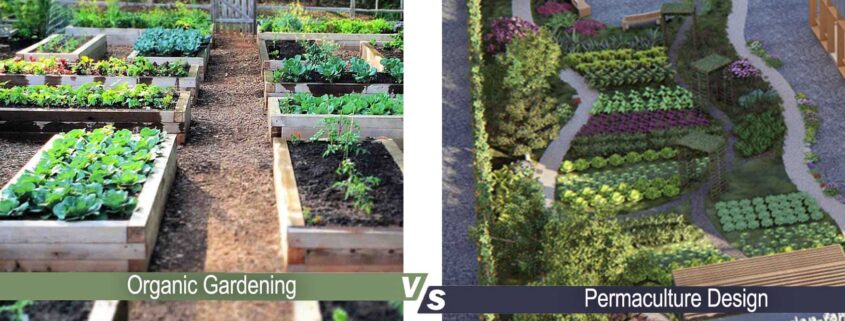Organic Gardening VS Permaculture Design
Agriculture as we know it is one of the – if not THE – essential factors in the global economy. It provides life-sustaining food for all people. Yet, the farming industry is far from being sustainable in any form. Its immense carbon emissions and use of chemicals pollute the environment and deplete the soil of its living organic matter. We should draw attention to the fact that soil degradation leads to “sterile” lands and, in some scenarios, desertification. People have been seeking solutions to address this challenge, which brings us to organic gardening and permaculture design. To understand the distinctions and similarities between these two options, I compare them both below.
ORGANIC GARDENING
Some farmers and individuals provide solutions for cultivating organic produce that is safer and healthier food.
Organic gardeners focus primarily on agricultural practices without using chemical pesticides and fertilizers. They use crop rotation, composting, animal manure-approved natural sprays, and other natural means to control plants’ pests and diseases. By using composting these farmers significantly help improve degraded agricultural land.
To understand the distinction between these two methods, we remark on their objectives. Organic gardening focuses on the agricultural output that offers people
healthy produce.
PERMACULTURE DESIGN
Permaculture is defined as sustainably cultivating farming ecosystems. The practice of permaculture design (aka Ecological design) deals with integrating systems such as growing food, health care, shelter, education, soil, land use, and security for all living things. It draws natural inspiration to develop synergetic farming systems based on plant diversity and guilds, soil fertility, saving energy and water.
As a design-focused system, it protects ecological regenerative functions and aims to ensure a long-term sustainable harmony with nature. It offers ways to regard and contemplate how things are naturally co-related.
PERMACULTURE FOUNDATION
Permaculture’s pillars are a set of ethics or, more specifically, three universally agreed-upon norms: earth care, people care, and fair share.
Earth Care
Whatever methods we use to pursue a yield should consider the preservation and stewardship of the land. In the end, caring for the earth will, in turn, ensure our ability to take care of the second ethic.
People Care
Human relationships, just like the relationships of the elements in a garden, are at the heart of people care. Because of permaculture, they would live more prosperous lives and create healthier communities.
Fair Share
The third ethic, Fair Share, is where we share abundance generously. Farming in a sustainable way means a fair share – reinvesting back in the people who do the work and into the system for future generations!
PRINCIPLES OF PERMACULTURE in short:
- A design system should follow observation and analysis.
- Whole systems thinking is a method to understand how elements are connected and how they influence one another sustainably.
- Creating no waste by using it as compost or recycling.
- Acting responsibly to protect the ecosystem and long-term sustainability.
- Ensures careful planning for the use of natural resources.
- Conserving diversity: polyculture instead of monoculture.
- Plant stacking for intensive growing.
- Energy planning: zones and sector design.
- Develop polyculture guilds and include perennials.
Permaculture is a highly developed Art, Science, and Philosophy – all in one.
It takes a bit more work and thoughtful planning to establish a permaculture garden than a typical organic garden. The permaculture planning and design will ensure the use of local natural resources and care for the soil restoration if needed. In that case, it will be the solution for nurturing not only individuals but an entire community.
Even if you practice organic gardening, you can still develop a sense of awareness for nature’s ecological harmony and preservation. A planetary view of climate change shows us the fragility of the earth. We must be aware of the global regenerative movement. One of the ways to participate in the change is by taking part in cultivating food in a resourceful way without creating waste. Organic gardening and Permaculture design are two systems that can accomplish the change needed to preserve the environment.
Taking from Buckminster Fuller’s adagio (message) “Think Globally – Act Locally” we paraphrase our mission statement to “Think Globally – Grow Locally”

